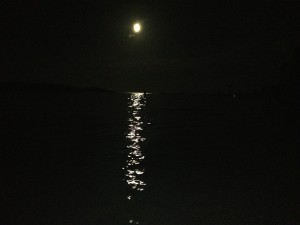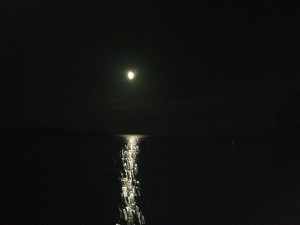 The technical name is a perigee moon, or a perigee-syzygy of the earth-moon-sun system, which means that the full moon tonight brings the silver rock as close to earth on its elliptical orbit as it gets. These extra-full moons happen about every 14 lunar cycles, so not quite once a calendar year. A swimming tide after dinner happens about once every two weeks during the summer around here. Nice to have both together.
The technical name is a perigee moon, or a perigee-syzygy of the earth-moon-sun system, which means that the full moon tonight brings the silver rock as close to earth on its elliptical orbit as it gets. These extra-full moons happen about every 14 lunar cycles, so not quite once a calendar year. A swimming tide after dinner happens about once every two weeks during the summer around here. Nice to have both together.
The flood tide tonight will be 7.5 feet at 11:58 pm, which means the storm drains on Beckett Ave will flood & we might get water sloshing up over the sidewalk on Clark Ave.
A beautiful evening for the first night swim of the season.
What does the sea feel, I wonder, when that fat moon pulls her up onto shore? Does she notice? The slow piling of water upon water, inching, gathering, surging up, so that what Fitzgerald called “the great wet barnyard of Long Island Sound” spills over itself?
Even these placid warm waters are part of the great god Ocean, insinuating its fingers around the world. I dive in because I know it, and I like how it feels like on my skin.
What would it take, I wonder, for the ocean to know me? What would I have to be? Ahab? Or 400 ppm?
It’s not a night for storms or strains or hard thinking. Just immersion by silvery light. I took a short swim out to the swimming buoy, spent a moment floating in cool water staring up at the moon, then walked back home.

Hello Steve,
I hesitate to just brashly introduce myself in a random comment, but I wanted to thank you for generating such a wonderful blog. I was an “auditor” in your 2013 SAA seminar and then became aware of the blog after someone mentioned it to me following Henry S. Turner’s wonderful “community” talk. I have taken some time this summer to read through the entire run of postings and have found so many wonderful reading suggestions and critical questions about ecocriticism and its connections to Shakespeare, et al. I teach English at a community college in the Detroit area and have been incorporating ecological and biological studies into my composition and Shakespeare courses as much as possible. Ensconced in the Great Lakes as I am, it’s been a freshwater perspective (I have had students who are training for great lakes “nautical” careers) mostly.
I also wanted to alert you to a writer (of course you may be completely familiar with him…he just hasn’t been mentioned on the blog), Christopher Priest (best known for “The Prestige”), who has a series novels and short fiction collections that he calls “slipstream fiction” and which centers on a fantastical alternate reality (I think) called “The Dream Archipelago.” The most recent novel in the collection, “The Islanders” is the most fascinating as it appears as a metafictional A-Z gazetteer of many of the islands and peoples that comprise the archipelago. I have been reading it concurrently with your blog and the “current” pun is both intended and a nice slipstream that I’ve drifted along on all summer.
Again, thanks for a wonderful, cogent, and insightful blog and I look forward to future entries (I am thankful also for the scholarly article postings as well).
Thanks for introducing yourself! I don’t get too many comments here, but I’m glad to hear from you. Perhaps I’ll see you at SAA this coming spring in St Louis? I’m giving a talk on “Flood” in A&C: more watery stuff. I don’t know Christopher Priest, but I’ll look him up.
Just ordered *The Islanders*!
Thanks! I will indeed be at SAA – St. Louis (really looking forward to Vancouver as well). The Antony & Cleopatra talk will definitely be on my itinerary. I became “aware” of Shakespearean ecocriticsm during the 2011 Summer NFH Folger Institute (“From the Globe to the Global”) and I actually read “At the Bottom of Shakespeare’s Ocean” in conjunction with that wonderful experience.